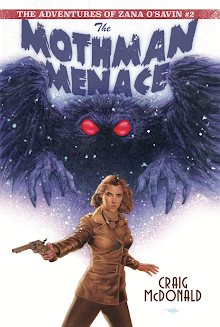I'm therefore presenting it here, I think, for the very first time...
--Craig McDonald
________
When
you did the signing you talked about how things seemed more real in the era you
wrote about. Can you elaborate on that and how it appears in the crime writing
(or writing in general) of those times?
My personal belief is that crime
fiction — both novels and films — stand as inadvertent documentary testaments
to their time in a way “literary fiction” and more stilted, studio films do
not. The great film noirs were often shot on shoestring budgets, off the back
lots and outside studios, and, so, on actual L.A. street locations. Pick the
right film noir, and you get to see Los Angeles in its 1940s or 1950s glory, as
it was: how the city looked, how people dressed and moved and interacted. Those
films are grounded and real. Similarly, you’re best served to go to Hitchcock’s
VERTIGO if you want to see the San Francisco of yore.
And crime fiction novels? It’s much
the same. They were written fast and in the moment and serve as time capsule
glimpses of their era in a way the so-called literary fiction of the time
doesn’t. In 1953, the Pulitzer Prize went to my own favorite novelist, Ernest
Hemingway, for THE OLD MAN AND THE SEA. Yet that novel by the quintessential
American stylist is not set in America and in fact depicts life in a destitute
Cuban fishing village. It’s a parable, at best. That same year, Raymond
Chandler published THE LONG GOODBYE, the only Chandler novel I truly love, and
which gives you a stronger, realer sense of American life in that year of ’53
than Hemingway’s most awarded work could hope to.
Which
of the crime fiction masters influence you the most?
Hammett is often compared to
Hemingway and you can find partisans arguing long into the night which writer
influenced which the most profoundly. (If you’re clear-eyed, Hemingway
certainly got their first, but he did eventually read Hammett.) Yet for all his
perceived similarity to my favored Hemingway, Hammett leaves me rather cold.
Chandler enamored me for the first two books when I was in college, but I
quickly lost fascination with him and came to regard him as
too-clever-by-half…too posed and kind of primping, except for THE LONG GOODBYE,
which I think is a more naked and wrenching book than Chandler intended. In
terms of the great writers of the 1930s and ’40s, I was most profoundly
influenced by the one-hit wonder William Lindsay Gresham and his carnival noir
NIGHTMARE ALLEY, and the fever dream output of the haunted and diabolically
prolific Cornell Woolrich. There was a period in the 1980s when a paperback
company was churning out glossy black, matched editions of Woolrich’s novels
and I collected and devoured them all, reading two or three a night.
Why
is it good for writers to read those that have gone before them?
When you write mystery or crime
novels, you’re working within a tradition. It’s the same for any genre or
sector of fiction writing. Like it or not, you’re the next link in the chain
and you best be prepared for the fact that your readers are schooled, formally
or informally, in that same tradition and come to the banquet with certain
culinary expectations.
It’s the classic caution — you can’t
be revolutionary and push the envelope until you know backwards and forwards
all the rules you’re breaking in order to effectively expand the boundaries. I
remember taking a course in epic poetry and being walked through the fact that
all these great epic poets, though sometimes separated by hundreds of years,
knew that they were bound by tradition and expectation to make tacit references
to the works they were hoping to build on or unseat, and, in fact, to
incorporate some element of the immediate predecessor epic poem in their own
work. In a very real sense, as Hemingway asserted, as writers, we compete
against the dead. As readers, we’re doing something along the same lines —
reading within a tradition and a canon. Not knowing what came before you is,
frankly, lazy or stupid.
What do you get
the most out of reading the vintage stuff?
For me, the classics of crime fiction embody the strategy I strive
for in my own writing — the notion that plot arises from character. For me, too
much contemporary crime fiction seems contrived, and, too often, pitched for a
movie deal, frankly. Consequently, I don’t read much contemporary crime fiction
written these days…perhaps two novels a year, if that. Instead, I try to ferret
out all those 20th Century novels in genre still to be plumbed. The
older I get, the more I find myself re-reading rather than reading. Life is
short and getting shorter so I tend to favor known quantities. Also, the very
best books speak to us in different ways at different stages of our lives.









































No comments:
Post a Comment